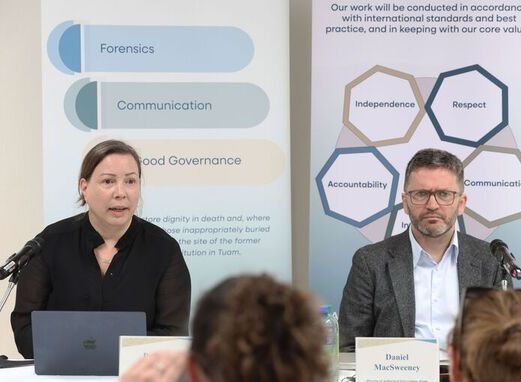Nora wants her family to live in the shadow of the Statue of Liberty, not in the shadow of illegality
By Ray O’Hanlon
She came to America with a Morrison visa, full of hope and ideas and ambitions.
She started a family and her hopes and ideas and ambitions soared with the arrival of each child.
Life, of course, isn’t typically a straight line, so there were distractions, diversions, setbacks.
But the American dream had locked itself in, surrounded her, her husband and her children.
And then it was taken away.
As immigration stories go, Nora’s (not her real name to protect her identity) is one of the more complex.
And as is so often the case, the complexity of her tale finds itself coming up against the deceptive simplicities of an often unyielding immigration system.
But at least Nora is here, in America, and with her family, those in it who are American citizens, and those in it who are not.
Nora is from Dublin. Her husband is not Irish. They are the parents of citizen sons.
They have been married for twenty five years.
Their recent wedding anniversary was cause for celebration, but a tempered one.
The anniversary also coincided with the issuing of green cards to Nora and her husband.
Another reason to celebrate?
Well, it would have been if they still had those green cards.
But back in 1992 all looked well enough to plan a big move to California where the offers of good jobs were icing on the green card cake.
Three good years in California were followed by a move to Colorado, again as a result of good job offers.
And then came the children, American kids, one, two three of them.
And then, after four years living in the shadows of the Rocky Mountains, the bottom fell out of the business that was supporting this growing naturalized, and natural-born, American family.
Social services vary from state to state. But immigration always brings understood risks, though immigrants tend to think positively and hope for the best.
Nora and her husband hoped for the best.
And they tried to avail of the best that their adopted state could offer.
“Help was offered for our U.S. born children…by informing us that they would take our children away and we could live in our car,” said Nora.
“We were in the United States for seven years and we were not offered any option of becoming U.S. citizens to avail of services we had paid into the entire time.”
No immediate funds were available to apply for, or retain, a lawyer to support applications for citizenship. Timing was an immediate issue as the projects Nora’s husband worked on were mainly international and took time to source and develop.
To avoid the family becoming a burden on the state, and to keep the family together, Nora’s relatives in Ireland arranged for tickets back to Ireland as well as shipping of personal effects – this to give the respite needed for the family to regroup.
“In Ireland, our children, having never set foot there, qualified for social benefits and medical assistance,” said Nora.
The medical care was especially important as one of her sons had, and to this day has, special medical needs.
“The help from the Irish government allowed us the respite required to regain our composure and seek employment back in the USA, or somewhere in the world.”
Nora’s husband did manage to land a job, a good one. But it was not in Ireland, and not in the United States.
But it was the citizenship of their sons that prompted Nora and her husband to continue looking for a way back to the United States, their preferred home for raising their family.
They would get close.
Nora’s husband, an expert in his field, was headhunted by a Canadian company and the family packed its bags again and headed for North America, ultimately Toronto.
They were now almost back. Almost. It was the summer of 2010.
All along, of course, the children were growing and were being educated. Grade school became high school and college beckoned.
One went to college in Dublin, two went to Florida.
Then Nora’s husband was out of work again.
College in Ireland was abandoned and the family began to concentrate in Florida.
But that would be a process, one involving border crossings from Canada into the U.S., back to Canada, back into the U.S.
During one of those border crossings, in 2012, the question was asked of Nora’s husband.
Why did Nora’s children have U.S. citizenship?
It was explained to the immigration officer that they had been born in the U.S. when Nora and her husband had been living legally in the country.
However, the green cards denoting legality had lapsed due to the years lived outside the U.S., these years away having been determined by employment.
“The officer asked if we wanted to reinstate our green cards and he could do this provided we relocated that day, and immediately,” said Nora.
Her husband agreed and he was sent over to the main office.
At the main office, Nora’s husband explained that he had never “abandoned” his U.S. residency; that he had lost his Job in Colorado, had to relocate to where the work was, and always had the intention to return to the United States.
The immigration officer, according to Nora, said that her husband was required to surrender his green card as it had expired and he would be declared inadmissible to the United States for ten years should he try to keep it.
Nora continues: “The officer did offer him the option of going before a judge there and then to plead his case.
“However, the officer also reiterated that should he fail to get clemency from the judge, he would be declared inadmissible from entering the U.S. for ten years. My husband was not up to speed with the law, did not have any representation, and was not willing to jeopardize being declared inadmissible for ten years.
“He filled out a form as Instructed. The officer went away and typed up a formal document. The officer brought a second officer to witness his signature.”
Nora’s husband was formally surrendering his green card, his pass into a legal life in America.
But this was to avoid being barred for ten years.
He reiterated that he had not actually abandoned his U.S. residency, but had moved out of the U.S. so as to work.
He was asked if he intended to resume permanent residence on this trip. The response was no, not on this visit. That would come later.
Later, roughly two months.
Nora accompanied her husband on another border trip.
Question were now asked of her.
One of them was why her husband had submitted a form surrendering his green card and she had not.
Nora duly went through the same questions, answers, and form filling.
She outlined her and her husband’s position that they had never actually abandoned their legal residence in the U.S., but had rather been forced to leave the country in search of work.
Nora indicated that she was hoping to reestablish her legal residence at some point in the future.
But first she had to formally surrender it, again with the proviso that she had the right to appear before a judge and be given a hearing that could have her legal status confirmed anew.
After all the questions and answers, Nora was asked if she had anything else to add to her statement.
Nora is a confident speaker and she did not hesitate.
“I love America and would love the kids to be raised here as they were born here.”
Says Nora: “We had never given up the right to permanent residency in the USA and in May of last year felt comfortable enough to complete the formal appeal before a judge to return to the USA.
“We scheduled a meeting with the immigration office in Buffalo, New York and brought all our documentation to them. On review of our paperwork, we were advised that the paperwork needed to be submitted at the U.S. border crossing.
“We returned to the border post and on submission of the paperwork we were informed that the process was quite simple and on reviewing our documentation there would be no issue.
“However, to complete the process, we were required to leave the U.S. and submit the same paperwork on our arrival back into the U.S.
“We crossed into Canada and immediately returned to the USA to submit the paperwork. The officer at the kiosk at the border crossing was expecting us and walked us over to the main building.
“Unfortunately, the helpful officer on duty had completed his shift and a very unhelpful officer refused to accept our paperwork and threatened to arrest us unless we withdrew our petition.
“We were also informed that there was no Judge available and that we risked being declared inadmissible for ten years.”
It might seem hard to believe, but an American life can sometimes hover between the kind and the cranky.
In this case, based on Nora’s version of events, it didn’t hover at all, but fell, and fell hard.
All the while, though, the American lives of the citizen children were being reestablished.
Family reunification, the idea at the heart of current U.S. immigration law, would seem to require that Nora, her husband and their children be together.
They are together now, in Florida.
But the basis for them being in the Sunshine State diverges sharply, depending on which side of the kitchen table the family members are sitting.
That table is a metaphor for a more insurmountable boundary, a border with all its rules, regulations and, yes, idiosyncrasies.
Clearly, all would be well if Nora and her husband were able to apply for new green cards.
This, according to Nora, would allow herself and her husband to instantly meet all financial commitments by gaining employment with the required pay to meet their family’s needs.
“If there was a way to do this I certainly would,” said Nora.
At one point, Nora and her husband attempted to raise their case and get advice on how to proceed from the U.S. Customs and Immigration Services office in Tampa.
“We tried to speak with someone as I made no headway over the phone and the only person I could speak to was external security given it was a secure facility. He threatened to have me forcibly removed if I continued insisting on meeting with anyone to simply ask for guidance.”
Nora’s efforts continue, for herself, her husband and her children. And they continue each and every day.
“I have called courts across the U.S., including Florida, and each one refers me back to the immigration authorities, citing that all requests for hearings with an immigration judge are scheduled through them.
“They won’t give me an appointment as they cite the fact that I need to 'follow a process that sees me apply through a specified immigration form' for all the optional visas available, which then is 'queued and over time followed by an appointment with U.S. Citizenship and Immigration Services who then determine whether we meet criteria to even go before that judge.
“When I called the U.S. Citizenship and Immigration Services to take this route I was told the process could take at least two years, and at best probably four years before I could even be considered.
“I was also told that despite the wrong forms and wrong information that resulted in our immigration being wrongly revoked, that no avenue would be available to review our case on the merit of this debacle.
“We never did abandon our green cards, and are trying to establish this through documented evidence which we are trying to have reviewed; furthermore, we are attempting to show that we were wrongly advised by a border patrol officer when they removed our respective green cards.
“It is evident, through the transcript of the reporting officer, that it was always our intention to return to the U.S.
“Several border patrol officers, in writing as well as verbally, advised us that we could go before an immigration judge at any time to seek to have our papers reinstated, which is what we have been trying to do for this past year, but to no avail as each time we are advised that this information given was incorrect - despite being transcribed on an official government document that we have on file.”
In the meantime, one of Nora’s citizen children has reached 21, an age when he could sponsor his parents for legalization.
But this process is a very difficult course to follow. The parents can’t work while the young adult must support the non-working parents.
The reverse, the normal parent/child financial relationship, is itself a mountain to climb for all too many parents these days, so child sponsorship of parents is not a viable option.
Meanwhile, what seemed so simple at the border is now a tangled, Kafkaesque, mess inside that border.
“I wish it were as simple as making that appointment to go before that judge as believe me if it was I would have done that months, years ago,” said Nora.
“The crux of the issue is that we never abandoned our immigration status as is wrongly cited in our file with U.S. Immigration.
“What we need is help to identify the facts of our case and a path forward to have our papers reinstated. This is the only humanitarian way forward.
“We want our American-born children to have that opportunity to be the leaders of society that they are so capable of being, and with that platform of support from their parents.
“We just want to be the providers as parents should be so that our sons can finally live free and enjoy their growing years.
“We don’t want them to have to support their working age parents. We want them to be able to count on us to support them.”









